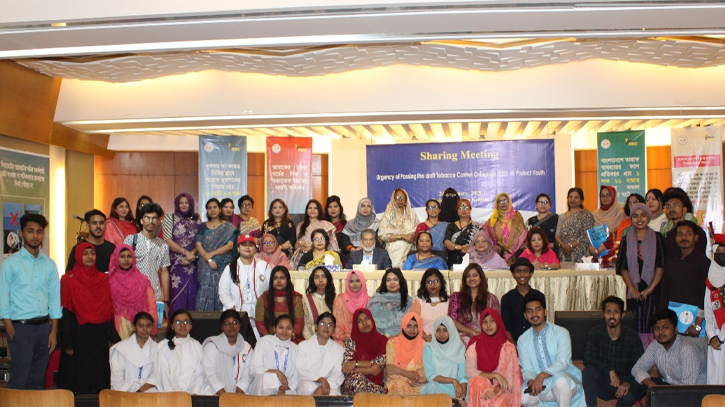
Photo : Courtesy
The government will take swift action to pass the Tobacco Control Law to protect public health, said Professor Dr. Sayedur Rahman, Special Assistant to the Ministry of Health and Family Welfare. He made this statement while speaking as a special guest at a discussion meeting titled "Tobacco Control Ordinance 2025: Importance and Necessity for Youth Protection" organized by Nari Maitree at the Bishwo Sahitya Kendra on Monday (February 24) at 11 AM.
He stated, "The process of passing the Tobacco Control Ordinance is ongoing. If the youth remain healthy, the country will be able to function smoothly."
The meeting was presided over by Shaheen Akter Dolly, Executive Director of Nari Maitree. Other guests included Sheikh Momena Moni, Additional Secretary (World Health Division). Expert discussants present were Mr. Md. Mostafizur Rahman, Former Chairman of Bangladesh Chemical Industries Corporation, and Professor Dr. Golam Mohiuddin Faruq, Oncologist and President of the Bangladesh Cancer Society.
The keynote paper was presented by Nasrin Akter, Project Coordinator of Nari Maitree. She highlighted that 442 people die daily in Bangladesh due to tobacco use. To curb this alarming death toll, she emphasized the urgent need to pass the amendments to the Tobacco Control Law proposed by the Ministry of Health, based on the World Health Organization’s Framework Convention on Tobacco Control (FCTC). The six key amendments include:
1. Eliminating designated smoking areas in public places.
2. Prohibiting the display of tobacco products.
3. Banning the sale of single sticks of bidi-cigarettes, unpackaged tobacco, and loose smokeless tobacco products.
4. Completely prohibiting tobacco companies from participating in Corporate Social Responsibility (CSR) activities.
5. Increasing the size of pictorial health warnings on tobacco packaging from 50% to 90%.
6. Implementing strict legal measures to protect youth from the harmful effects of e-cigarettes.
Speakers at the discussion pointed out that tobacco companies are spreading false propaganda, claiming that the proposed amendments would lead to massive revenue losses for the government. However, the reality is quite the opposite. Since the Tobacco Control Law was enacted in 2005 and amended in 2013, government revenue has increased 12.5 times over the past 18 years. Additionally, between 2009 and 2017, tobacco consumption in Bangladesh declined by 18%.
Another misleading claim made by the tobacco industry is that the amendments would displace 1.5 million retail sellers from employment. However, according to the Bangladesh Bureau of Statistics (BBS) Wholesale and Retail Business Survey 2021, Bangladesh has 1.54 million retail businesses, of which only 196,341 stores sell food, beverages, and tobacco products. Moreover, since these stores typically sell a mix of products, the law’s passage would not significantly impact their employment.
Sheikh Momena Moni assured the attendees that today's discussion would be presented at the Ministry of Health’s Executive Committee Review Meeting. She also promised to inform the relevant authorities to take necessary steps for the swift passage of the Tobacco Control Law amendments.
At the meeting, Ashrafia Jannat, Convener of the Anti-Tobacco Youth Forum, stated, “Every day, 442 people die due to tobacco use, yet our society remains silent. Growing up in a healthy and safe environment is our right. We urge the government to implement these amendments immediately and gift us a healthier society.”
Additionally, members from the Anti-Tobacco Mothers' Forum, Teachers' Forum, Girl Guides Rangers, and the Red Crescent strongly demanded the swift passage of the Tobacco Control Ordinance 2025. The speakers expressed hope that the people-oriented government would prioritize public health and pass the amendments as soon as possible.
Messenger/Tarek








